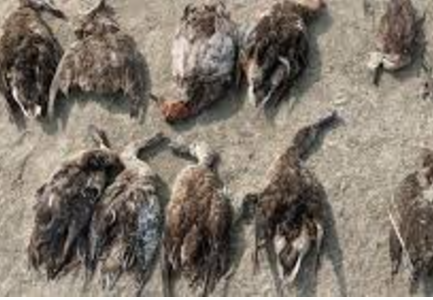Migratory Bird Deaths Linked to Avian Botulism
High temperatures and low salinity in Sambhar Lake have led to a concerning outbreak of avian botulism. This situation has resulted in the deaths of at least 600 migratory birds in Rajasthan. Reports indicate that the die-off began on October 26, 2024, and lasted for approximately two weeks.
What is Avian Botulism?
Avian botulism is a disease caused by the toxin of the bacterium Clostridium botulinum. This toxin leads to paralysis in birds and can be fatal. The spores of this bacterium are commonly found in wetland sediments.
High temperatures and low oxygen levels contribute to outbreaks of avian botulism. The Wildfowl & Wetlands Trust (WWT) emphasizes that organic nutrient abundance can also play a role.
Weather Impact
The India Meteorological Department (IMD) reported that the Jaipur district, near Sambhar Lake, experienced above-average temperatures throughout October. Maximum temperatures were 1 to 5.1 degrees Celsius higher than normal.
October typically sees an average rainfall of 13.7 millimetres in the region. However, this year, no rainfall was recorded, leading to high daytime and nighttime temperatures.
Water Quality Changes
P Sathiyaselvam from the Bombay Natural History Society noted that a sudden change in water quality may have triggered the outbreak. Freshwater inflow could have reduced salinity levels in the salt lake.
Migratory Bird Vulnerability
Migratory birds arrive exhausted from long travels. This exhaustion, combined with low immunity, makes them more susceptible to diseases like avian botulism. As birds die and decay, maggots form, contaminating the water and affecting other wildlife. There is no treatment for avian botulism; removal of affected birds is advised.
Historical Context
A similar outbreak occurred in 2019 at Sambhar Lake, resulting in nearly 18,000 bird deaths. Such outbreaks are challenging to predict due to their dependence on specific environmental conditions.
About 57 diseases have been reported among wild birds globally. Similar cases of avian botulism have been documented in Australia and the United States under comparable environmental conditions.
Important Facts for Exams:
- Sambhar Lake: Sambhar Lake is a salt lake located in Rajasthan India. It is the largest inland salt lake in India and has important ecological importance.
- Clostridium botulinum: Clostridium botulinum is a bacterium that produces a potent toxin. This toxin causes paralysis in birds and can be lethal if ingested.
- Wildfowl & Wetlands Trust: The Wildfowl & Wetlands Trust is a UK-based charity. It focuses on the conservation of wetlands and waterfowl through research and education.
- Bombay Natural History Society: The Bombay Natural History Society is one of the oldest nature conservation organisations in India. It conducts research and promotes conservation awareness among the public.
Month: Current Affairs - November, 2024
Category: Environment Current Affairs


